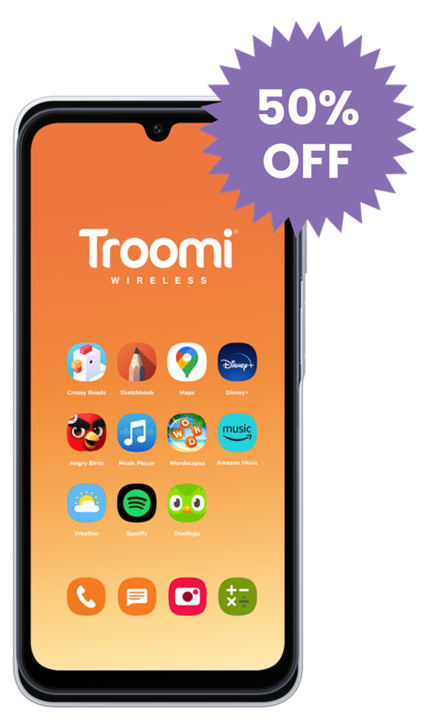I don’t know what it is about kids and cell phone use, but it feels like sometimes we, as parents, lose our minds when it comes to rules and expectations. We swing anywhere on the spectrum from total lockdown all the way to total freedom without limitations or oversight. Both solutions, to me, feel a bit extreme. Why do we act this way? We wouldn’t hand our toddler a pocket knife on a camping trip and say, “’Go have fun.” On the other hand, we wouldn’t (hopefully) encourage our teenagers to take and pass a drivers’ education course only to insist on driving them everywhere they go until they turn 21. So why do we find it so difficult to translate these common-sense responses into helping our teenagers navigate responsible phone use, appropriate screen time management, and firmly set screen time limits?
Parenting is Work
If anyone tries to tell you that parenting isn’t work, they probably don’t have kids. Every parent, step-parent, foster parent, or parent figure knows that parenting is one of the hardest jobs you’ll ever have. So it might not surprise you to learn that I discovered some great parenting tips—especially when it comes to best practices with our kids and cell phone use—in a book I recently read about improving the workplace.
In Rookie Smarts: Why Learning Beats Knowing in the New Game of Work, author Liz Wiseman explains what it takes to help new employees succeed in the workplace. She reminds readers that new employees come with their own strengths and understanding. But they need leadership and guidance to navigate new terrain, much like our kids.
Our children understand the tech world in a way that most parents are still trying to figure out. But what we may lack in being tech savvy is offset by what we bring in experience, maturity, and concern.
Wiseman offers three tips for helping new employees succeed that we can use to help our children navigate the brave, new world of cell phone use with confidence. They are: 1) Freedom with direction, 2) a constructive challenge, and 3) a tightrope with a safety net.
Let me explain.
Freedom with Direction
First, our kids need freedom with direction. That means we must give them space to fail. As much as my mother heart hates to admit it, failure is part of the learning curve. Therefore, we must allow our kids to experience failure from time to time.
But here’s the very important caveat. Our kids must be able to recover from the failure. Wiseman explains, “As a parent, I’ve learned to ask myself a simple question: Is this a mistake they can recover from? If so, it’s good rookie terrain—step back and let them learn from experience. If not, hover close and offer very specific guidance or coaching. If it is truly one-strike-and-you’re-out (for example, drinking and driving), a wise parent might pull them out of the game.”
This principle applies to appropriate cell phone use.
Discuss the expectations and consequences associated with cell phone use and then give your kids the guided freedom to gain experience. After agreeing on set screen time limits, which websites are acceptable and appropriate for your family, and other important Internet safety rules, allow your teenagers some freedom to stay within the bounds. They will take more ownership of their Internet experience as you let them prove they can handle it.
Then, if they fail, they will understand the consequences in a controlled environment where you can continue to teach about appropriate cell phone use.
A Constructive Challenge
In the workplace, this equates to giving a new employee a specific task to accomplish that fits into a sweet spot—one that will stretch them without overwhelming them. Wiseman describes it this way: “When the learning gap is too big, people can break down. Conversely, when the challenge is too small, people never embark.”
For our kids and their phones, this translates into being deliberate about how much autonomy you are willing to give your kids. Give them too much and they will crash and burn. Give them too little and they will fail to develop the habits they desperately need to be responsible cell phone users in the future. Since phones aren’t going away, we can help our kids find their sweet spot when it comes to screen time control, screen time management, and appropriate Internet use by giving them the appropriate challenge.
For some, this means setting parental controls or monitoring texts and browser histories. For others, it means checking music and website choices for appropriateness. You know your kids. You know your expectations. The key is customizing their phone use to their needs and abilities and then monitoring that use frequently.
As your kids mature and prove that they can handle the challenge of appropriate phone use, together you can continually evaluate and reevaluate their level of autonomous phone use.
A Tightrope and a Safety Net
Finally, see your kids as tightrope walkers. As you give them a little more responsibility with their phones than they might be ready for, they are essentially learning a new—and sometimes difficult—skill. And with any new and difficult skill, they will probably fall more than a few times as they master the balance. In this setting, offer them the safety net of your watchful eye and willingness to catch them when they fall.
Help your kids see your safety net as a support system for success rather than a punishment for failure. If your kids know you want them to have good experiences with their phones, they will hopefully be more open to the correction, limits, and sometimes consequences of taking missteps. The important part is communicating to your kids your desire to help them be responsible phone users while still keeping them safe in an unsafe online world.
Not the Bad Guy
As a parent, I don’t want to be the bad guy when it comes to my kids and cell phone use. I don’t want to swing too far to the lockdown realm or too far to the bounds-free quicksand. But more than that, I don’t want the real bad guys or the real bad situations to win because I haven’t done my job as a parent—making sure my children know how to navigate their cell phone use. With good counsel like giving kids freedom with direction, constructive challenges, and a chance to walk the tightrope with a safety net, I hope to help them set and embrace appropriate limits so they can feel confident in their cell phone use.


